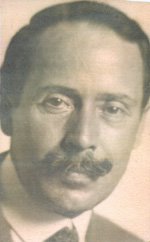
Beckett fact no. 59.
This is Almidano Artifoni, who appears under his own name in Ulysses and brushes against an aggrieved blind stripling as he passes 'Mr Bloom's dental windows'.
The Mr Bloom in question, however, is a dentist, and nothing to do with the other Mr Bloom. It's just a little Joycean joke.
In the same way, the reference to Watt in Murphy during the anti-hero's lunch –
Murphy had some faith in the Külpe school. Marbe and Bühler might be deceived, even Watt was only human, but how could Ach be wrong?
– might be a joke too, if there was any evidence that Beckett had thought of the milk-drinking Watt back in the mid-30s. But there isn't, and the Watt he means is Henry J. Watt, founder of Glasgow University's School of Psychology in 1907 and an associate of the Würzburg School. The other Würzburger, Ach, believed in a Derren Brown-ish theory of determining patients' responses to stimuli, but try as he might Murphy fails to bend Vera the waitress to his will.
Christopher Ricks notes that the 1.83 cups of tea Murphy nevertheless extorts from her possesses a dot over the 3 (for infinite recurrence) in the English but not the French text. But then, where the man in Play prefers Lipton's his French equivalent in Comédie prefers ‘l’Éléphant’.
Unlike his green tea-drinking lady friends, he suffers from pronounced hiccups, while in Human Wishes Levett emits a hiccup 'of such force' he is almost thrown off his feet. His friend Dr Johnson never turns up, but had he done he could have demonstrated his epic tea-drinking skills, often drinking as he did up to 25 cups at one sitting.
There is a Johnson in Malone Dies, along with a Wilson, Nicholson and Watson, 'all whoresons', but whether or not it's the tea-drinking doctor I don't know. Perhaps it's a case of mistaken identity, or just a little Beckettian joke.
No comments:
Post a Comment